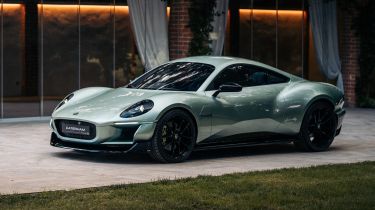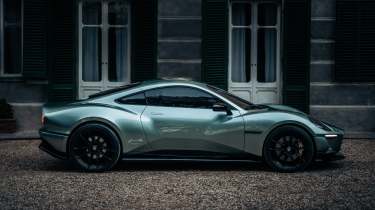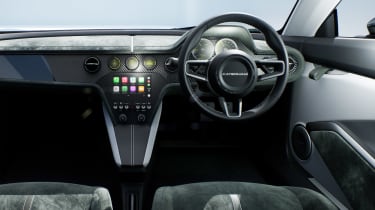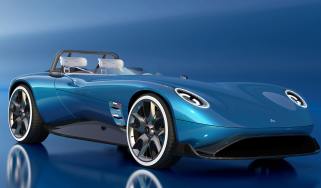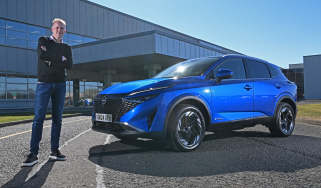New Caterham Project V: all-electric sports car to get Yamaha power
Caterham’s bold new future will see an electric coupe join its ranks with a Yamaha-developed powertrain
Caterham is going electric and it’s recruited Yahama to help in the powertrain department. The Caterham Project V concept car has already given us a clear pointer towards the form that the future Caterham electric sports car will take and now the British sports car brand famous for the iconic Caterham Seven has announced a partnership with Yamaha that will assist in giving the model the performance it will need.
The production version of the Project V will use Yamaha’s lightweight e-axle technology and a prototype is already in development with Tokyo R&D, a specialist engineering house, with a target for completion of mid-2025.
What do we know about the Caterham Project V?
There have been periods in the past when Caterham has dabbled with the idea of models other than its iconic Seven, such as the 21 of the nineties, and the stillborn mid-engined C120 sports car that was to share its make-up with the Alpine A110. Now the small British maker is entering the electric era with its focus on a compact 2+1-seat coupe, called Caterham Project V.
This new all-electric machine was created by British designer Anthony Jannarelly, and with Yamaha now on board to supply the powertrain it is slated to go into production as early as the end of 2025, according to Caterham. The firm is serious about the car as a road-going machine, although that Project V name is likely to be just a working title.
The Project V concept car is powered by a 55kWh battery, but the production version using Yamaha e-axle tech will have two battery packs, one in front of the rear axle and a second under the front footwells. The powertrain will be installed in a lightweight chassis made from carbon fibre, glass fibre and aluminium composite, featuring double wishbone suspension with fully adjustable geometry all-round. Caterham is aiming for a kerb weight of just 1,190kg.
This relative lack of weight compared with many other EVs means the battery will provide a target range of 249 miles and feed a 268bhp rear-mounted motor for a projected 0-62mph time of 4.5 seconds. Rapid charging at up to 150kW means a 20 to 80 per cent top-up will take as little as 15 minutes, so it’s clear Caterham has an eye on track work when it comes to the Project V’s intended use.
“Project V is not just a concept or design study,” said Caterham CEO Bob Laishley, adding: “We’ve conducted engineering and production feasibility throughout the development process.
“An electric Caterham of any shape and size has to stay true to what sets us apart from everyone else: being lightweight, simple and offering an unparalleled driving experience; that’s our DNA.”
When it comes to the car's design, Jannarelly outlined that “a Caterham Seven’s design is simple and minimalist, it’s designed for its intended function, to be lightweight and fun to drive. With Project V, we’re applying this philosophy to the sports coupe architecture to create a seducing and timeless silhouette. Every single feature has to justify itself from a weight perspective to maintain lightness and optimise driver engagement.”
This extends inside as well. The Project V show car features a 2+1 seating layout, although a 2+2 configuration will be optional on the production version. Caterham says the 2+1 set-up means getting in and out is easier, while there's more space in the rear for the single passenger, making Project V a more usable machine than some other small sports coupes.
The interior is focused on the driver, with a simple instrument readout that includes key info. Smartphone mirroring will also be included, while the V offers three drive modes to choose from: Normal, Sport and Sprint. These settings adjust the steering weight and throttle response/acceleration for different driving environments, says Caterham.
According to Laishley: “Project V isn’t instead of Seven, it’s complementary to it, and we believe that by retaining the core Caterham values, it will appeal to both our existing customer base and attract new fans to the brand.”
The British firm recently revealed its Seven EV concept, a zero-emissions version of its iconic two-seater sports car, carrying it through into the modern era. The brand's boss believes there's room in the range for another model too, and that “by using a more practical coupe body style and by exploiting the packaging benefits of an electric car, this is a car that works as well for trips to the shops, or the school run, as it does for Sunday morning sprints.”
With a working prototype using Yamaha’s technology due by mid-2025 and a targeted production date towards the end of 2025 or early in 2026, the eventual road-going Project V could cost less than £80,000, the company has indicated.
Now read our review of the Wiesmann Project Thunderball...
Find a car with the experts

